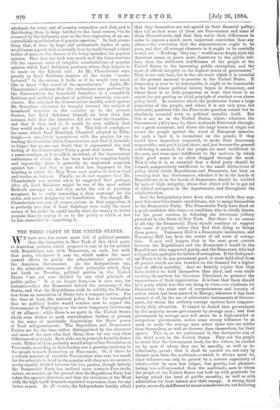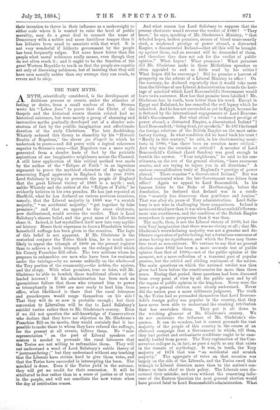THE THIRD PARTY IN THE UNITED STATES.
WE have seen few events more full of political promise than the formation in New York of this third party in American politics, which proposes to cast in its lot neither with Republicans nor with Democrats, as such, but with that party, whichever it may be, which makes the most earnest efforts to purify the administrative practice of the American Government. As the Independents say, in the admirable statement of their principles which they put forth on Tuesday, political parties in the United States "are not now divided by any vital principle of public policy." It is no longer true,—as it once was, for instance,—that the Democrats defend the autonomy of the States, and that the Republicans wish to solidify the Federa- tion from an association of States into a compact nation. For the time at least, the national policy has so far triumphed that no political leader would venture now to regard the Government at Washington as the mere temporary instrument of an alliance ; while there is no party in the United States which even wishes to push centralisation further at present in the sense of materially diminishing the State power of focal self-government. The Republican and Democratic Parties are for the time rather distinguished by the character and aims of the men who lead them, than by any very clear difference of principle. Both alike are in principle heartily demo- cratic. Either of them probably would adopt either Protection or Free-trade, according as their leaders saw a growing tendency in the people towards Protection or Free-trade. Or, if there be a certain number of scientific Free-traders who care too much for the principle to bend to the popular will, they are, we suspect, pretty equally divided between the two parties, though latterly the Democratic Party has inclined more towards Free-trade, rather, we suspect, on the ground that the Republican Party has taken the opposite direction, and that the irritation of the West with the high tariff demands organised expression, than for any better reason. At all events, the Independents frankly admit that they themselves are not agreed on their financial policy,; they tell us that some of them are Free-traders and some of them Protectionists, and that they waive their differences in order to express a much more important conviction than any other,—the conviction that the administration ought to be pure, and that all corrupt elements in it ought to be carefully rooted out. "Nothing," they say," would more deeply stain the American name, or prove more disastrous to the public wel- fare, than the deliberate indifference of the people of the United States to the increasing public corruption, and the want of official integrity in the highest trusts of government." That is not only true, but is the one truth which it is essential at the present moment to practise in the United States. If democracy is ever to be honourable, it ought to be honourable in the land whose political history began in democracy, and where there is so little pauperism or want that there is no excuse for not putting an ideal principle of conduct even above policy itself. In countries where the proletariat forms a large proportion of the people, and where it is not only poor, but miserable, questions like the Free-trade question cannot but be absolutely essential even to political morality itself. But this is not so in the United States, where, whatever the Government racy may be, there is already Free-trade through- out a great continent, and where the large tracts of virgin soil secure the people against the worst of European miseries. In such a land it is incumbent on the people, if they would have democracy respected, to make their democracy respectable; and yet it is just there, and just because the general well-being is assured, that the people are most indifferent to the acts, and even more indifferent to the motives, by which their good name is so often dragged through the mud. This is why it is so essential that a third party should be formed, comparatively indifferent to the small distinctions of policy which divide Republicans and Democrats, but bent on securing that the Government, whether it be in the hands of Republicans or in the hands of Democrats, should be wielded by men of high integrity, whose first object will be to get rid of official corruption in the departments, and throughout the administration.
And the Independents have been wise, even while they sup- port Governor Cleveland's candidature, not to merge themselves in the Democratic Party. The Democratic Party have fixed on a good candidate this time,—a candidate who is chiefly known for his great services in defeating the inveterate jobbery prevalent in the State of New York. But there is no reason at all why the Democratic Party should continue to support the cause of purity, unless they find that doing so brings them power. Tammany Hall is a Democratic institution, and Tammany Hall has been the centre of all sorts of corrup- tion. It may well happen that in the next great contest between the Republicans and the Democrats it would be the Republicans who supported purity, and the Democrats who had relapsed into apologies for habits of corruption. If the Independ- ent Party is to do any permanent good, it must hold aloof from all parties which are not founded on the demand for a higher type of official morality. And we heartily rejoice that they have decided to hold themselves thus aloof, and even while exerting themselves for Governor Cleveland, to preserve the separateness of their organisation. It is time that there should be a party which has this one thing in view,—to vindicate for Democracy the same sort of scrupulousness and honesty of action which has been secured in Europe, wherever it has been secured at all, by the use of aristocratic instruments of Govern- ment, for whom the ordinary corrupt motives have compara- tively little attraction. It Cannot be denied that government by the majority means government by average men ; and that government by average men will never be a high-minded or scrupulous government, unless some strong influence be at work to make the average men select those who are nobler than themselves, as well as cleverer than themselves, for their agents. This is, as we understand it, the distinctive aim of the third party in the United States. They ask the people to insist that the Government shall, for the future, be carried on by men of whom they can be morally, as well as in- tellectually, proud ; that it shall be carried on, not only by sharper men than the multitude,—which it always must be, since influence can only be gained by a certain superiority of talent,—but by men less vulgar, less greedy, less pleasure- loving, less self-interested than the multitude, men to whom the people of the United States can look up with gratitude for having raised the level of public morality, as well as with admiration for their talents and their energy. A strong third party, avowedly indifferent to minor considerations, but declaring their intention to throw in their influence as a makeweight to either scale where it is wanted to raise the level of public morality, may do a great deal to connect the name of Democracy with a nobler and more fastidious temper than it has hitherto been usual to associate with that word. It is not very wonderful if hitherto government by the people has been frequently vulgar. Yet none know better than the people what moral nobleness really means, even though they do not often reach it ; and it ought to be the function of the great Western Republic to teach us that the people are capable not only of discerning nobleness, but of insisting that they will have men morally nobler than any average they can reach, to revere and to obey.



































 Previous page
Previous page